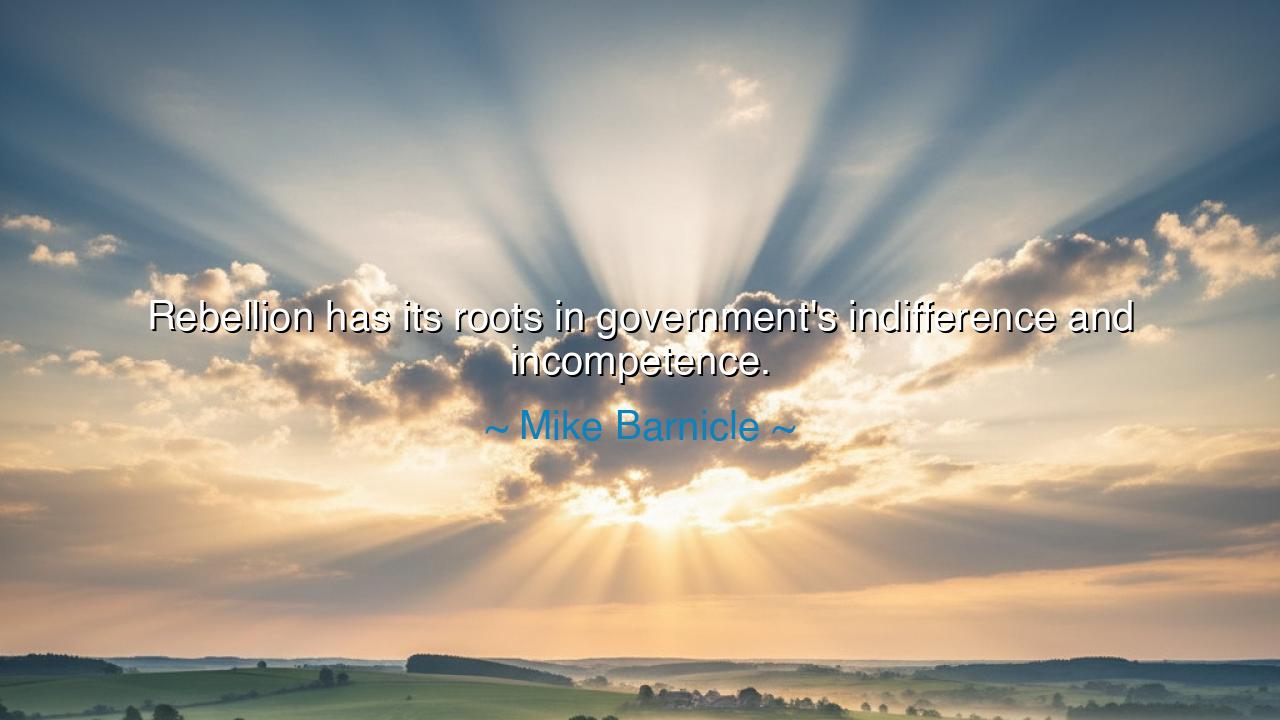
Rebellion has its roots in government's indifference and






In the still and uneasy heart of every nation lies a truth too often ignored — that the strength of a people is bound to the justice of their rulers. It was this truth that the American journalist Mike Barnicle gave voice to when he declared:
"Rebellion has its roots in government's indifference and incompetence."
These words are not born from anger, but from observation — from the long memory of history and the wounds of society. Barnicle, a chronicler of the common man, speaks to the deep and ancient law that governs the balance between power and people. For rebellion, in its truest form, is not born from wickedness or chaos, but from neglect — from the silence of rulers who no longer listen, and from the blindness of institutions that no longer see. It is not the voice of destruction, but the cry of the unheard.
The meaning of Barnicle’s words is as eternal as government itself. When those entrusted with leadership grow indifferent — when they forget the sufferings of their citizens, when they turn their gaze from the hungry, the poor, and the forgotten — the seeds of revolt take root. And when they grow incompetent, when they fail to govern wisely, when corruption replaces compassion and arrogance replaces humility, those seeds are watered by despair. Rebellion, then, becomes the harvest of injustice. It is not born from malice, but from the slow decay of trust — the moment when the governed no longer believe that those in power can, or will, do what is right.
Throughout the ages, the story repeats itself. The French Revolution rose not from sudden hatred, but from decades of hunger and neglect. While the peasants starved, their rulers feasted; while the people pleaded for bread, the monarchy built palaces. The cry of “Liberté, Égalité, Fraternité” was not a song of chaos, but the lament of a nation betrayed by its own indifference. Likewise, the American Revolution began not in the desire for violence, but in the demand for fairness — for a government that heard the voice of its people rather than the echo of its own authority. Both revolutions were born from the same wound: when power ceases to serve, the people will rise to restore the balance.
Barnicle’s insight also speaks to our modern age. In times of prosperity, leaders may forget that their duty is not merely to rule, but to care. When bureaucracy grows deaf to the cries of injustice, when the gap between ruler and citizen widens, unrest begins to stir beneath the surface. One need only look to the struggles of recent decades — from the Arab Spring to protests against corruption and inequality across continents — to see that rebellion still emerges from the same soil. When governments turn cold and distant, the people warm themselves with the fires of revolt.
Yet Barnicle’s words are not a call for rebellion — they are a warning. They speak not to those who would destroy, but to those who would lead. A wise ruler heeds the quiet murmurs before they become shouts. He listens to the discontent not as an insult, but as a signal — a reminder that leadership is not command, but service. For indifference is the first betrayal of duty, and incompetence the second. Together they build the walls that separate power from people, and once those walls rise too high, they cannot be dismantled without force.
History also tells us that rebellion, though righteous in cause, is terrible in cost. Once unleashed, it consumes the guilty and the innocent alike. The lesson, therefore, is not merely to justify rebellion, but to prevent its necessity. The only government that endures is one that remembers the human heart — that governs with empathy, efficiency, and humility. When leaders care deeply and govern wisely, rebellion withers before it blooms. When they listen to the pain of their people, the nation breathes in peace rather than fire.
So let this teaching endure: rebellion is not born in the streets — it is born in the halls of power. It is the child of neglect and the heir of arrogance. To lead well is to guard against this fate — to rule with eyes open and heart awake. Let every citizen, too, remember their part: to hold leaders accountable, to speak truth with courage, and to serve justice before comfort.
Thus ends the teaching: when indifference blinds the powerful, and incompetence weakens the state, rebellion becomes the voice of the forgotten. But when compassion and wisdom dwell in government, the people need not rise — for they already stand together in harmony and trust.






AAdministratorAdministrator
Welcome, honored guests. Please leave a comment, we will respond soon